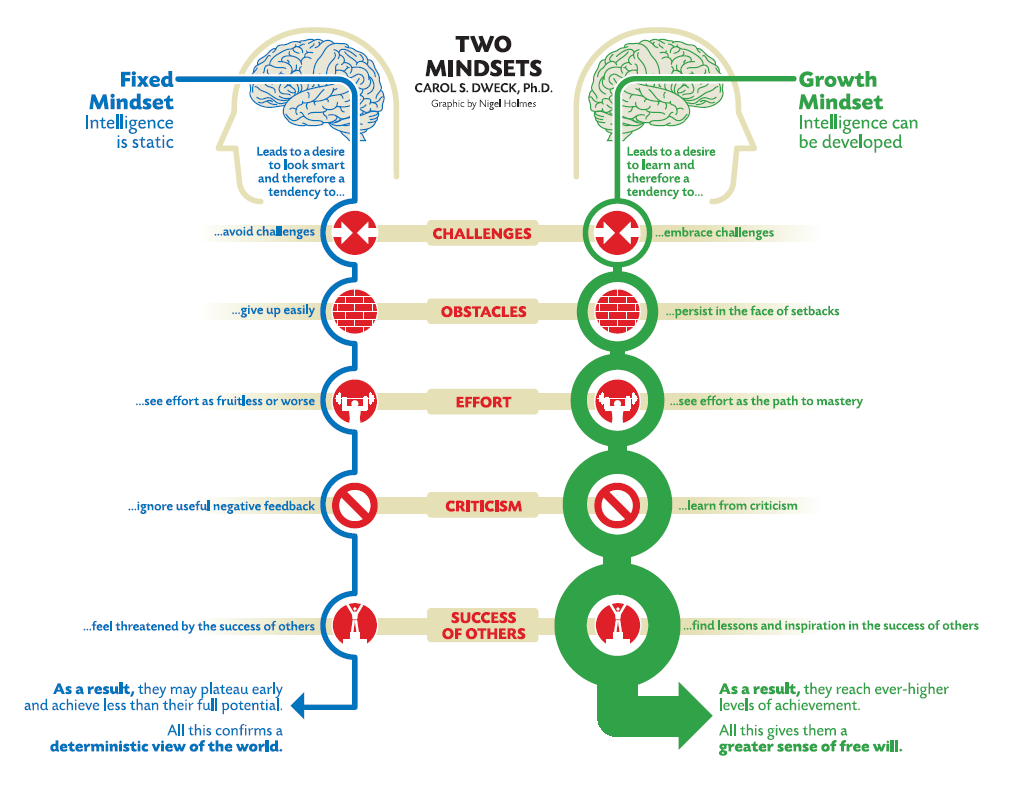Growth Mindset
Growth Mindset, as defined by researcher and author Carol Dweck, is the belief that talent, ability and intelligence can be developed with effort, effective strategies and support from others as opposed to being fixed qualities that are unchangeable. Cultivating a growth mindset can help you transform the beliefs you have about yourself, change your response to challenges, and optimize performance. Applying a growth mindset will make you more likely to navigate the ups and downs of your college experience, embrace challenges as opportunities for growth, and persist in the face of setbacks.

Consider these approaches to develop a growth mindset:
- Challenge yourself to recognize the power of mindsets. Embrace the belief that ability (e.g./ intellectual, artistic, musical, athletic) is malleable and that mistakes are opportunities for learning.
- Recognize that you can grow your abilities over time by applying effort, seeking feedback, developing effective learning strategies, engaging in practice and making use of resources.
- Distance your identity from performance. This can be very difficult if you have been consistently praised for being “smart” or “a good athlete” or “talented” growing up. However, integrating your identity with performance can actually undermine your performance. This is especially true when you perform well because of how much is at stake if at any moment you do not perform well. Instead, attach your identity, the effort you apply and your motivation to the value of effort and the process of learning itself.
- “I am someone who persists and challenges myself to learn even when it becomes difficult because that’s how I grow.” vs “I performed well because I am good at math.”
- When you hear yourself using labels such as “I am not a _________ (math, writing, science) person” question how and when these beliefs began to develop. Challenge this fixed mindset by identifying the ways in which you have made or can make progress in this area over time with increased practice.
- Remind yourself that struggle does not mean that you are incapable. The strain of trying to learn is the process that invokes learning. Struggle is simply a natural part of the learning process indicating that additional steps, strategies and/or support is needed.
- Focus on verbs (your persistence, effort, problem-solving) not labels (being smart, talented, athletic) not only when making errors, but especially when you have performed well.
- Analyze errors and get help to understand why you did not perform as well as you would have liked. Identify what verbs led to poor performance versus applying labels. Identify specific action steps for how you can improve. Remember that mentors, advisors, coaches, and professors are passionate about their fields and welcome conversations with students who are seeking to learn and improve!
- Seek out mentors, advisors, coaches and professors who espouse a growth mindset and who are willing to share their own setbacks, including how they learned and grew from their experiences with adversity.
- When something is challenging, praise yourself for seeking feedback, trying new approaches, investing effort, and progress made toward developing a deeper understanding. These are key elements to developing a growth mindset.
- To deepen your understanding of growth mindset, try an exercise of writing a letter to the next person going through your struggle to explain the difference between applying a growth mindset and a fixed mindset as a way to help improve your own performance now and in the future.
Interested in learning more?
Watch this talk to learn more about Mindset and Success.
Listen to this podcast about how to Enhance Performance and Learning by Applying a Growth Mindset.
References
Crum, A. J., Jamieson, J. P., & Akinola, M. (2020). Optimizing stress: An integrated intervention for regulating stress responses. Emotion, 20(1), 120–125.
Dweck, C. S. (2006). Mindset: The new psychology of success. Random House.
Yeager, D.S., Bryan, C.J., Gross, J.J. et al. A synergistic mindsets intervention protects adolescents from stress. Nature 607, 512–520 (2022).